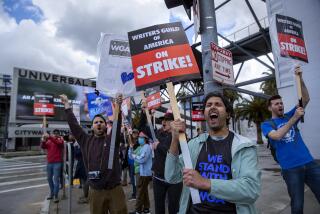The Price of an Interview
- Share via
Movie studio publicists, who are meeting too little protest as they tighten their grip on the entertainment press in this country, are finding Europeans more restive. Many German entertainment writers spurned Paramount Studios’ demand that they strictly obey embargoes on when they could publish reviews of “War of the Worlds.” When Warner Bros. flew foreign journalists to the Bahamas recently for interviews with Johnny Depp in connection with “Charlie and the Chocolate Factory,” the studio demanded embargo agreements at the last minute. Many of the writers followed the Germans’ example and refused to sign.
There’s at least a rational argument that embargoes on movie reviews create a level playing field for reviewers. But studios and star publicists make far more demands.
Stars’ personal publicists have long been notorious nitpickers. Now studio publicity departments also want to control what is written about stars and movies. Recently, journalists wanting to interview Angelina Jolie for “Mr. & Mrs. Smith” had to agree not to ask personal questions. Encouragingly, some refused, but the majority went along.
Anyone wanting the cooperation of Warner Bros. in writing a pre-release article about a film must first agree to terms on not only when the article can run, but on how long it will be -- “the text must not be longer than half a page.” The studio’s questionable reasoning is that it wants short, early stories, with bigger spreads closer to release. Those not signing get no cooperation and those who write more than the stipulated amount are barred from future Warner Bros. events.
Acceding to the publicists’ demands leads to ever more restrictions, thus the gushing tone of many Hollywood interviews. The smaller and less powerful a media outlet, the more scrupulously the rules must be obeyed.
It’s not easy to defy a source’s rules: Even the White House press corps is having trouble presenting a united front against constant briefings “on background,” meaning the source cannot be named. Still, if more entertainment journalists defied or at least openly protested -- in an organized way -- the studio and publicist restrictions, coverage of Hollywood would be more real-time, more honest and more useful to consumers.
More to Read
The biggest entertainment stories
Get our big stories about Hollywood, film, television, music, arts, culture and more right in your inbox as soon as they publish.
You may occasionally receive promotional content from the Los Angeles Times.










